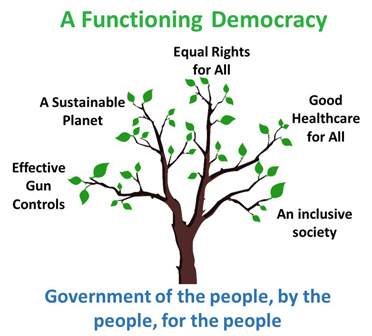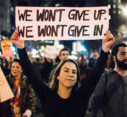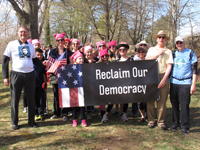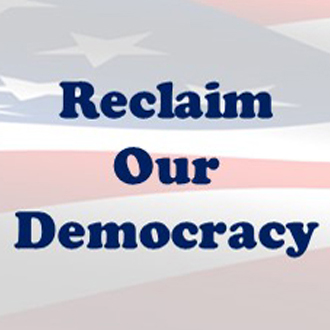“When a movement is strong enough it doesn’t matter who is in the White House; what really matters is what people do, and what people say, and what people demand.” [Howard Zinn]
“Public sentiment is everything. With public sentiment nothing can fail; without it, nothing can succeed.” [Abraham Lincoln]
Be Inclusive
 The book Daring Democracy is an excellent source for building the movement. It encourages us to draw on the energy of hope, and to make the Democracy movement actively inclusive, embracing differences of race and culture with a common commitment to justice and democracy. If we are to build a movement powerful enough to take on authoritarianism and big money, all of the democracy reform efforts need to work together, and the Declaration for American Democracy has been created to do that. We also need support from other related movements: environmental justice, human rights, women’s empowerment, workers’ rights, immigration justice, and many others. Without democracy there’s almost no chance of tackling distinct environmental, racial justice, poverty or labor issues. If your own passion lies in one of these areas, imagine your own specific issue as a branch of a single majestic tree. Your bough is beautiful and needed, but its flourishing depends on a healthy trunk and root system (a functioning democratic government of the people, by the people, for the people).
The book Daring Democracy is an excellent source for building the movement. It encourages us to draw on the energy of hope, and to make the Democracy movement actively inclusive, embracing differences of race and culture with a common commitment to justice and democracy. If we are to build a movement powerful enough to take on authoritarianism and big money, all of the democracy reform efforts need to work together, and the Declaration for American Democracy has been created to do that. We also need support from other related movements: environmental justice, human rights, women’s empowerment, workers’ rights, immigration justice, and many others. Without democracy there’s almost no chance of tackling distinct environmental, racial justice, poverty or labor issues. If your own passion lies in one of these areas, imagine your own specific issue as a branch of a single majestic tree. Your bough is beautiful and needed, but its flourishing depends on a healthy trunk and root system (a functioning democratic government of the people, by the people, for the people).
Racial justice and our democracy groups are inseparable. Marginalized communities must be engaged from the beginning and included in leadership positions. Authoritarian and big money interests disproportionately hurt people of color. If you accomplish structural democracy reforms that change who is able to build political and social power, that will have a big impact on racial justice.
communities must be engaged from the beginning and included in leadership positions. Authoritarian and big money interests disproportionately hurt people of color. If you accomplish structural democracy reforms that change who is able to build political and social power, that will have a big impact on racial justice.
All of our different groups need to support and show up for each other. That’s how we will build a powerful movement.
According to the Resistance Guide, (another excellent resource!), social movements can do more than shift opinion – they can make once-radical opinions into a new conventional wisdom.
In order to build a movement that is steadily growing you need three types of actions:
- Public protests that bring in new supporters and change people’s minds about what is politically possible
- Acts of resistance focused on people in power (politicians, corporations, billionaires)
- Electoral politics that oust the current representatives who oppose what we want and replace them ones who support what we want
Public Protests
In a democracy, public protest is the most effective way to be heard in the absence of either money or fame. Protest polarizes and successful polarization moves people from being neutral to being willing to take a stand. Even those who disapprove of protesters can come around to support their cause. Sacrifice and disruption are very important in capturing public attention. Sacrifice touches others by demonstrating seriousness of commitment. Disruption captures public attention, and often outweighs its alienating effect. However, violence and property destruction discourage participation and lessen a movement’s effectiveness. Avoid these tactics.
of either money or fame. Protest polarizes and successful polarization moves people from being neutral to being willing to take a stand. Even those who disapprove of protesters can come around to support their cause. Sacrifice and disruption are very important in capturing public attention. Sacrifice touches others by demonstrating seriousness of commitment. Disruption captures public attention, and often outweighs its alienating effect. However, violence and property destruction discourage participation and lessen a movement’s effectiveness. Avoid these tactics.
Sustained participation is important. It may take several protest events to make someone aware and several more to get them to pick a sid e. Keep showing up! Make your message clear: signs with easily understood concise statements; speak in sound bites that define problems and solutions and identify heroes and villains. Appeal to common sense values. One unified message over and over is stronger than varying the message event to event. Build support but don’t worry about winning everyone over. “Keep the pressure on with different tactics and actions, and utilize all events of the period for your purpose” [Saul Alinsky]. Organize game changing events such as the 2017 Women’s march (>4 million participants) and more frequent targeted events that can be duplicated week to week, preferably in different locations. Document the actions on social media and encourage your friends and followers to join with you.
e. Keep showing up! Make your message clear: signs with easily understood concise statements; speak in sound bites that define problems and solutions and identify heroes and villains. Appeal to common sense values. One unified message over and over is stronger than varying the message event to event. Build support but don’t worry about winning everyone over. “Keep the pressure on with different tactics and actions, and utilize all events of the period for your purpose” [Saul Alinsky]. Organize game changing events such as the 2017 Women’s march (>4 million participants) and more frequent targeted events that can be duplicated week to week, preferably in different locations. Document the actions on social media and encourage your friends and followers to join with you.
We encourage you to gather a group of like-minded individuals who want to participate in the Democracy Movement and start doing some of the actions listed below, or even better, actions you create from your own ideas.
Some Ideas for Taking Action:
- Organize a regular protest in a public place

- Make a personal shared pledge to act – pledge cards with one commitment to act for democracy
- Establish a writing group – letters to the editor, op-ed pieces, social media
- Share a link to this site ReclaimOurDemocracy.org with your friends and family.
- Start your own group Facebook page and share your actions with the Reclaim Our Democracy Facebook page – we would love to hear your ideas!
- Assemble a small group of friends and neighbors to view one of the videos and then discuss it.
- Guerilla theater troupe – street theater, flash mobs

- Hand out cards at public events
- Celebrate democracy – share and teach songs related to freedom & democracy
- Organize a multi-group protest march with signs
- Organize highly visible citizen deliberations to choose long term strategies and priorities for immediate action
- Produce 3-5 minute YouTube videos on how people are affected by big money in politics
- Create and distribute bumper stickers
- Reach out to social justice groups in local colleges and universities
- Become a hub for multiplying power and building community

- Organize a bike ride
- March in a parade
- Create new public spaces for community talk “People’s Corners”
- Change your Facebook page to show solidarity
- Drop a banner from an office tower
- Create a democracy logo
- Appear on local access TV
Groups to Align With: Declaration for American Democracy, League of Women Voters, Faithful Democracy, Poor People’s Campaign, Democracy Initiative, Democracy Matters, Common Cause, Public Citizen, Represent.US, Move On, Our Revolution, American Promise, Women’s March, Color of Change, Black Lives Matter, 350.org, Cosecha, Sunrise Movement
Acts of resistance focused on people in power
 Target the powers that be, the decision-makers. Call, write or show up to communicate with legislators. The Indivisible Guide is an excellent source of help for working with legislators. Take actions to influence corporations as employees, customers or shareholders. Think about your sphere of influence where you can make your views known.
Target the powers that be, the decision-makers. Call, write or show up to communicate with legislators. The Indivisible Guide is an excellent source of help for working with legislators. Take actions to influence corporations as employees, customers or shareholders. Think about your sphere of influence where you can make your views known.
Some Ideas for Taking Action:
- Become a citizen lobbyist both by phone and personal visits
- Organize product boycotts or picketing
- Public disobedience – occupy a public or private space, sit-ins, sing-ins
- Block entry to legislative chambers
Groups to Align With: Indivisible, Town Hall Project, Move On, Our Revolution, Working Families, Peoples Action, ACLU People Power, Center for Popular Democracy
